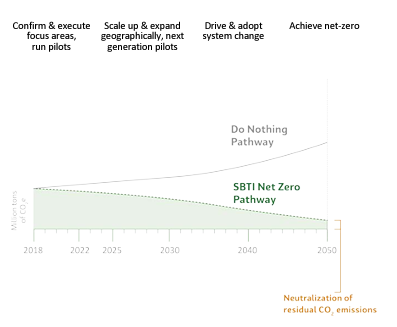Mondelēz 2023 Snacking Made Right Report: Our 2050 Net-Zero Emissions Goal
At Mondelēz International, we are part of a broad movement across our sector that aims to bring about more sustainable ways of growing a business. For us, this involves aiming to reduce our environmental impact while helping to support resilience across our supply chains and the communities our business touches.
Our near-term 2030 goal vs 2018 base year aims for:
-35% GHG emissions reduction across our value chain (21).
Our long-term 2050 goal vs 2018 base year aims for:
NET-ZERO GHG emissions reduction across our value chain (7).
We focus on areas where we believe we can make the greatest positive difference for the long term. This includes aiming to reduce our impact on the environment across key focus areas including our operations, our supply chain and our communities.
We have signed the SBTi’s Business Ambition for 1.5°C, aligning our long-term emissions mitigation targets with the Paris Agreement’s aim of limiting temperature rise. We've also joined the United Nations “Race to Zero” campaign to help build momentum toward a decarbonized economy.
In April 2024 the SBTi (Science Based Targets initiative) successfully validated our near-term net-zero target resulting in the approval of our full value chain goal to reduce absolute end-to-end GHG emissions 35% by 2030 and net-zero by 2050 from a 2018 base year. Find out more on SBTi’s website.
Our carbon footprint is assessed end-to-end encompassing emissions from field to shelf and we are addressing approximately 90% of these emissions in our goal boundary (7).
OUR NET-ZERO ROADMAP FOLLOWS THE SBTI REDUCTION PATHWAY
We are implementing the SBTi reduction pathway following distinct phases.
Our near-term goal is to reduce our end-to-end CO2e emissions by approximately 35% by 2030 compared to a 2018 baseline, in line with the SBTi’s Net-Zero Standard. Along with our Scope 1, 2 and 3related goals, this includes the break out of emissions driven by Forest, Land and Agriculture (FLAG) inline with the SBTi’s FLAG guidance for land-intense sectors (7).
As we have set a near-term goal by 2030 aligned with our net-zero validated target, we are incorporating the approach and learnings of our previously validated end-to-end CO2e emissions 2025 goal into our updated roadmaps.
REDUCING CARBON: THREE KEY DRIVERS
At Mondelēz International, we focus our strategic efforts on three prominent drivers of carbon emissions at play in the food and beverage sector: the changing use of land, including deforestation; emissions related to farming; and use of fossil fuels. That’s why we regard deforestation-free, regenerative agriculture and the avoidance of fossil fuels as key focus areas to help cut our emissions.
Today, we’re focused on what really matters: shifting our ingredient supply chains away from sources where deforestation has any role to play; focusing on regenerative agriculture that uses ecological principles to sustain and restore degraded soils; and embracing renewable energy sources and low-impact, more sustainable packaging. To effectively bring these three strategies to life we have identified our main focus areas and created reduction roadmaps for each.



